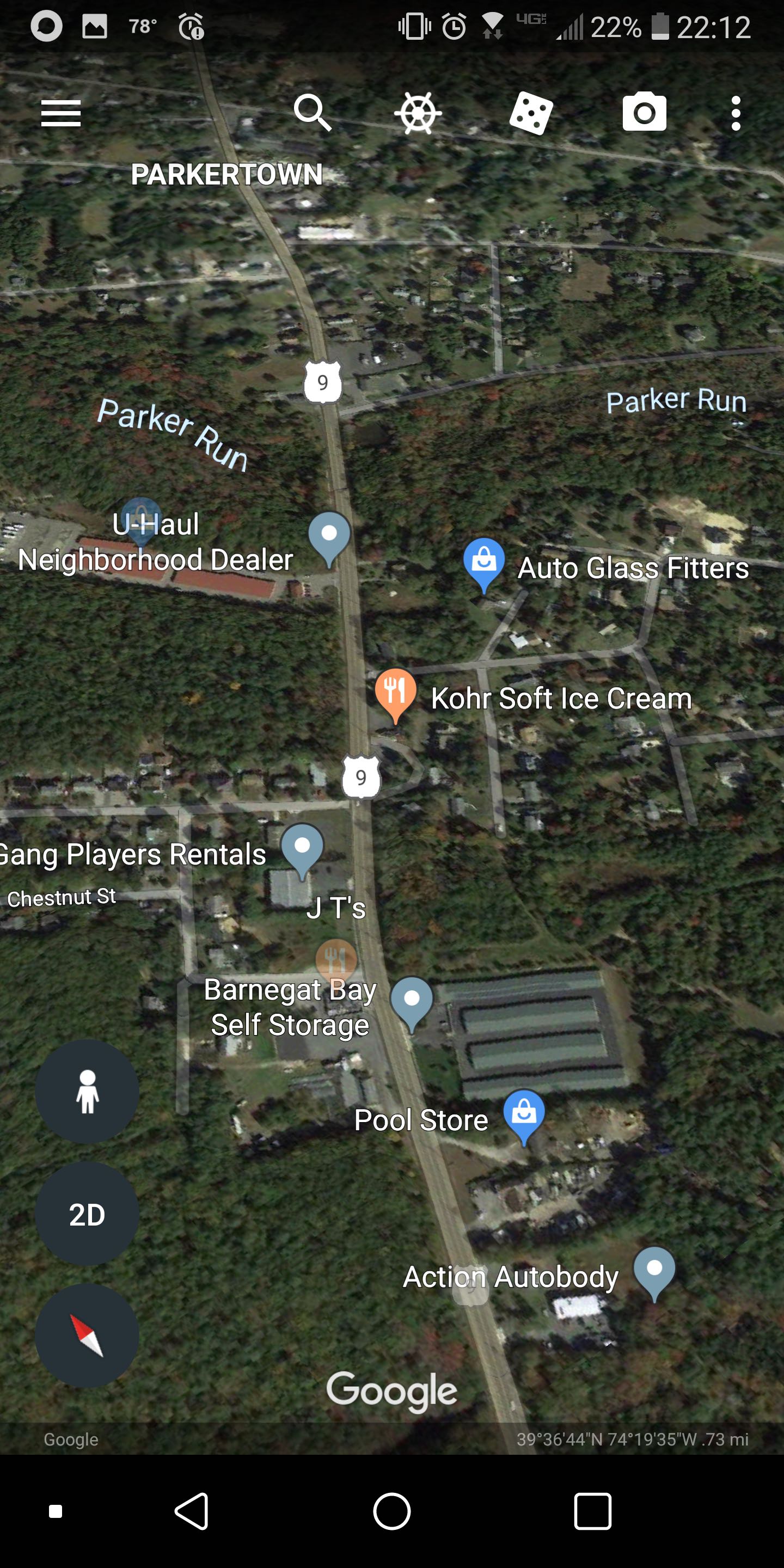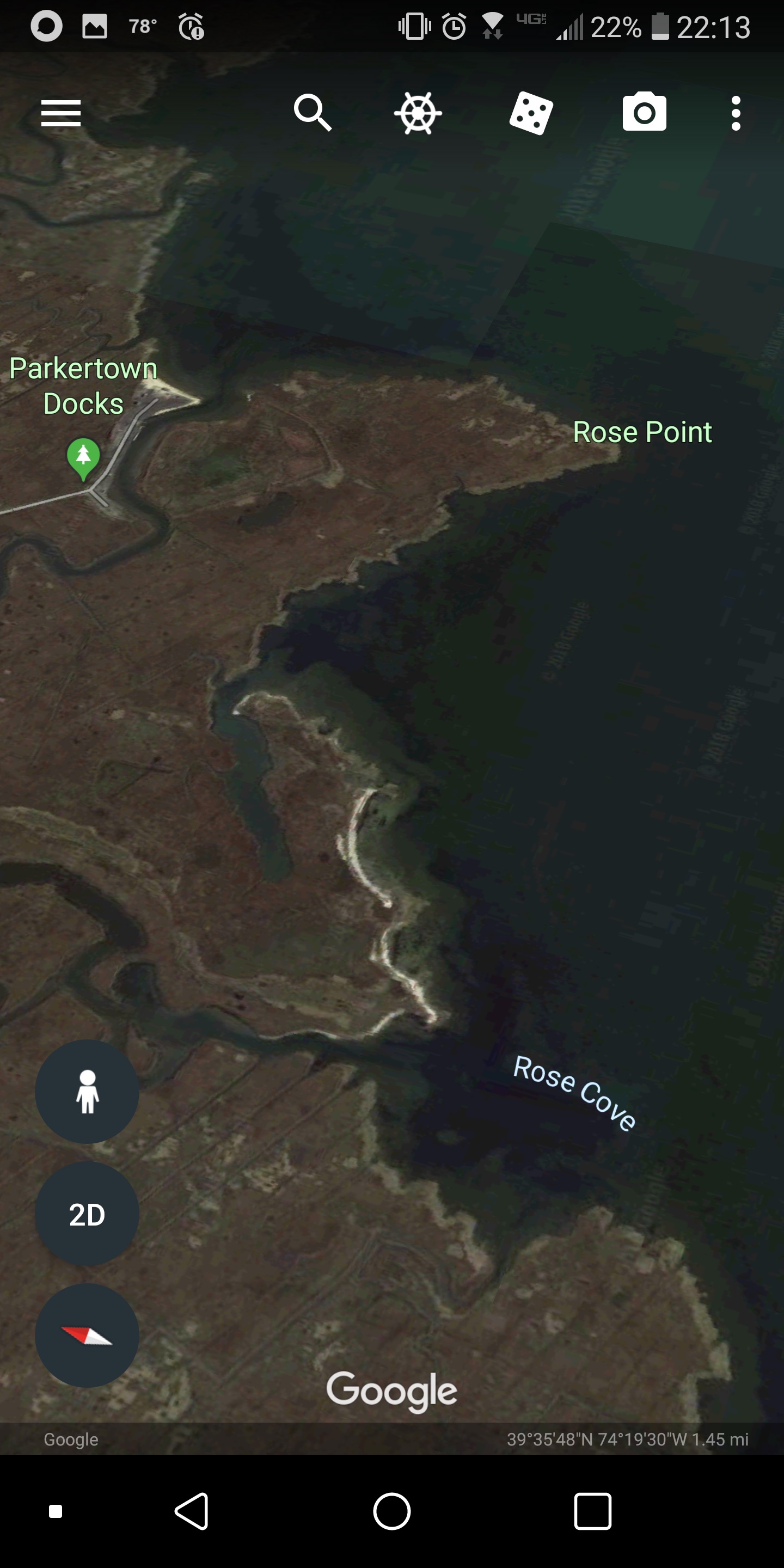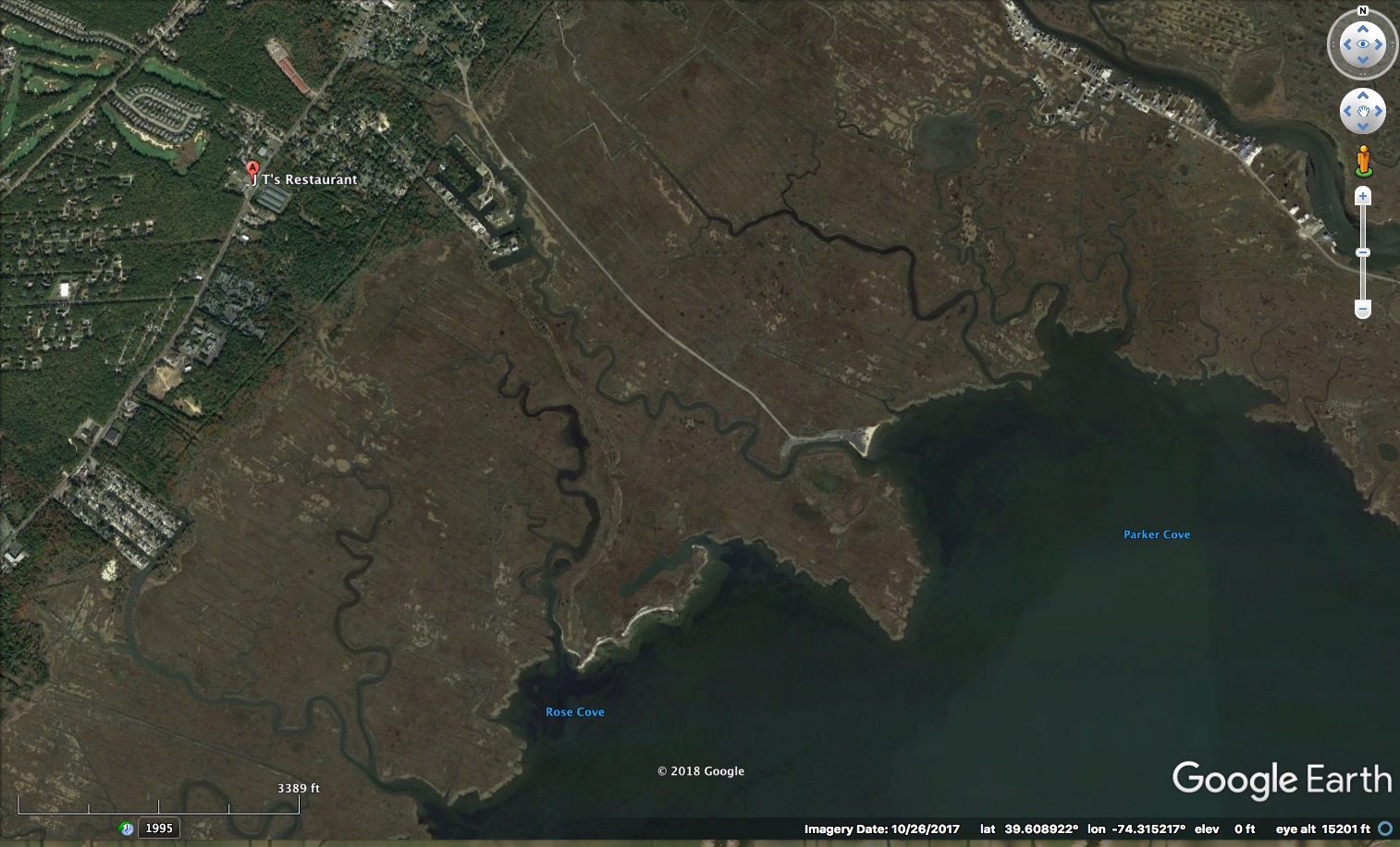


http://jytangledweb.org/randomhistorybytes/
Last Update: Thu Oct 15 16:30 EDT 2020
A few years ago I was asked at a meeting if I knew where the "the public house or cabin of William Rose, between West Creek and Clamtown (now Tuckerton), in Burlington County." was. This is where the infamous Revolutionary War Loyalist outlaw John Bacon met his demise, and was documented in 1887 by Edwin Salter.
I didn't know. But as I make listen and learn rounds with historians, and was attending a presentation by Tim Hart [Timothy Hart, Division Director of the Ocean County Cultural & Heritage Commission]. I asked if he knew. It turns out, he did. This post is to share that knowledge, and thus to perpetuate it in wider collective knowledge. Here is what he told me.
The William Rose public house was located across from, and a little bit up (North) from J.T.s Restaurant. I fired up Google Earth on my cell phone, and asked him to help me pinpoint it further. Tim pointed out the current site as the Kohr Soft Ice Cream Shop there on Route 9. The building there now is an odd V shaped building.
Tim also gave supporting evidence of the presence of the Rose family in this area is found if you look directly SE (perpendicular to Route 9) where you find Rose Cove. And the point on the Northern edge of Rose Cove is Rose Point.
The original building is long gone, and its precise site is not known for sure.
See attached maps.
GPS coordinates of the Kohr Soft Ice Cream Shop: 39.62087 -74.31854.
References: "Old Times In Old Monmouth - Historical Reminiscences of Old Monmouth County, New Jersey, Edwin Salter and George C. Beekman, 1887, pp. 122-124. Originally published in the Monmouth Democrat, Freehold, N.J., 1887. Reprinted: Genealogical Publishing Co., Inc., Baltimore, 1980.
"A History of Monmouth and Ocean Counties", Edwin Salter, 1890, E. Gardner & Son Publishers, Bayonne, N. J., pp. 210-212.
To perpetuate the historical legacies of Edwin Salter and George Beekman I will share the relevant text in the next post. It is an interesting read.
The following account of the death of Bacon was furnished to the New York Historical Society by the late Governor George F. Fort.2
"John Bacon was a notorious refugee who had committed many depredations along the shores of Monmouth and Burlington counties. After having been a terror to the people of this section for some time, John Stewart, of Arneytown, (afterwards Captain Stewart), resolved if possible to take him. There had been a reward of fifty pounds sterling offered by the Governor and Council for his capture, dead or alive. A short time previous, in an engagement at Cedar Creek Bridge, Bacon and his company had discomfited a considerable body of State troops, killing a brother of Joel Cook, of Cook's Mills, (now Cookstown), Burlington county, which excited much alarm and exasperated the whole country. On the occasion of his arrest, Captain Stewart took with him Joel Cook, John Brown, Thomas Smith, John Jones, and another person whose name is not recollected, and started in pursuit, well armed. They traversed the shore and found Bacon separated from his men at the public house or cabin of William Rose, between West Creek and Clamtown (now Tuckerton), in Burlington County. The night was very dark, and Smith being in advance of the party, approached the house, and discovered through the window a man sitting with a gun between his knees. He immediately informed his companions. On arriving at the house, Captain Stewart opened the door and presenting his musket demanded a surrender. The fellow sprang to his feet, and cocking his gun was in the act of bringing it round to the breast of Stewart, when the latter, instead of discharging his piece, closed in with him and succeeded after a scuffle in bringing him to the floor. He then avowed himself to be John Bacon, and asked for quarter, which was at once readily granted to him by Stewart. They arose from the floor, and Stewart (still retaining his hold on Bacon) called to Cook, who, when he discovered the supposed murderer of his brother, became exasperated, and stepping back gave Bacon a bayonet thrust unknown to Stewart or his companions. Bacon appeared faint and fell. After a short time he recovered and attempted to escape by the back door. Stewart pushed a table against it. Bacon hurled it away and struck Stewart to the floor, opened the door, and again attempted to pass out: but was shot by Stewart (who had regained his feet) while in the act. The ball passed through his body, through a part of the building, and struck the breast of Cook, who had taken a position at the back door to prevent egress. Cook's companions were ignorant of the fact that he had given Bacon the bayonet wound, and would scarcely credit him when he so informed them on their way home. They examined Bacon's body at Mount Misery, and the wounds made by both bayonet and ball were obvious. They brought his dead body to Jacobstown, Burlington county, and were in the act of burying it in the public highway, near the village in the presence of many citizens who had collected on the occasion, when Bacon's brother appeared among them and after much entreaty succeeded in obtaining his body for private burial."
This affair took place on Thursday evening, April 3rd, 1783.
As there have been some disputes in traditionary accounts as to the exact manner of Bacon's death, we have been at much trouble to get at the truth. Some old residents of the vicinity where he was killed are positive that he was shot down after asking for quarter. They say that Captain Stewart's party suddenly opened the door and pointed a musket at Bacon, who instantly rose up and held a table before him and begged for quarter, but the musket was fired, and the ball went through the table and killed him. But after much patient investigation and inquiry we believe this story is untrue, and that the correct version is about as Governor Fort has given it. We are sorry to add, however, that the party treated the body with unjustifiable indignity. As soon as Bacon was killed his body was thrown into a wagon with his head over the tail-board, and the party drove for home that same night. Young Cook seemed quite "carried away" to think he had avenged his brother's death, and at the inns at Mannahawkin and Mount Misery, insisted on treating Bacon with liquor, fastening open his mouth while he poured liquor into it. The descendants of British sympathisers have charged the party with much cruelty, but the only foundations are the indignities offered to his body; and even there we can find some palliation for it, when we consider the excitement bordering on frenzy, of young Cook.
In addition to what has been quoted from Governor Fort regarding Bacon's burial, we have heard it stated that in accordance with an ancient custom with great criminals, the intention was to bury Bacon at the forks of some, public roads, with a stake driven through the body; but his brother's arrival changed their plan. This brother of Bacon's was generally respected where he was known.
The writer of this is under impression that before the war Bacon's home was in Burlington county, though he occasionally worked in Stafford township, in Ocean county, and he has been told that Bacon left a wife and two sons at Pemberton; that his widow married a man named Morris, and that the two sons emigrated West, and became respectable and useful citizens.
It is but just to add that among old residents, generally of the Society of Friends, who though sympathizing with the Americans, yet were non-combatants, that Bacon was held to be among the most honorable of the refugee leaders. They say that except calling for a meal's victuals for himself and men in passing, he never molested the persons or properly of any but Americans in the militia service.
Before closing, we will say that, although our State Council of Safety had declared Bacon an outlaw, and offered a reward for him dead or alive, yet it is probable that if he had been taken alive and delivered to the civil authorities he would have been liberated in pursuance of the treaty with England.
Hetfield, a much worse man than Bacon, many years after the war, had the impudence to return to Essex county (to endeavor to secure some property there), when he was arrested for his misdeeds during the Revolution; but the judge decided he must be liberated in pursuance of the treaty with England. Most of the old residents in Essex well remember the intense excitement and indignation raised by the return and liberation of this scoundrel.
The refugee leaders in our State — Hetfield, Bacon, Lippincott, Davenport, Moody and others— all doubtless held commissions from the "Board of Associated Loyalists," of which the President was William Franklin, the last British Governor of New Jersey.
-----
1 The text in this section is from: "Old Times In Old Monmouth - Historical Reminiscences of Old Monmouth County", New Jersey, Edwin Salter and George C. Beekman, 1887, pp. 122-124. Originally published in the Monmouth Democrat, Freehold, N.J., 1887. Reprinted: Genealogical Publishing Co., Inc., Baltimore, 1980.
2 This sentence is from: "A History of Monmouth and Ocean Counties", Edwin Salter, 1890, E. Gardner & Son Publishers, Bayonne, N. J., pp. 210-212. which has the same basic story edited a little differently.


